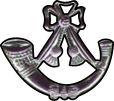Absolutely. Many members in the hobby reenact as a family with the men on the line with their
wives portraying campfollowers or, occasionally, serving on the line as well. Children can be inexpensively outfitted
as children of the period.
Military experience is not in any way necessary. The drill of the period is very different
from that of today, so you'll have to start again anyway. Some knowledge of safe handling of firearms is an assest,
but that too can be taught by our NCO's.
Generally members purchase most of their uniforms from the period sutlers that attend events.
Many of them can be found on our Related Links page. Check with the unit before you buy anything, however. As we strive
to accurately portray a unit in the British Army, uniformity is key. We would hate for you to buy something that
you couldn't wear as a member of our group. Uniforms can also be made if you or someone you know is adept at sewing.
Many of the raw materials can be bought from the unit stores, so, again, check with unit before you buy.
Although it would be difficult for you to join us at drills and meetings, you are welcome
to simply join us at events. We already have members from across Ontario. If you contact us, however, we may be
able to put you in touch with a group closer to you.
Sorry about that. The uniforms are very hot in the summer and the men sweat a lot.
As well, when black powder burns, the residue it leaves is sulphur, hence the rotten-egg smell. When reenacting, members
live in their tents for days. We'll try to stand upwind, though.
|

